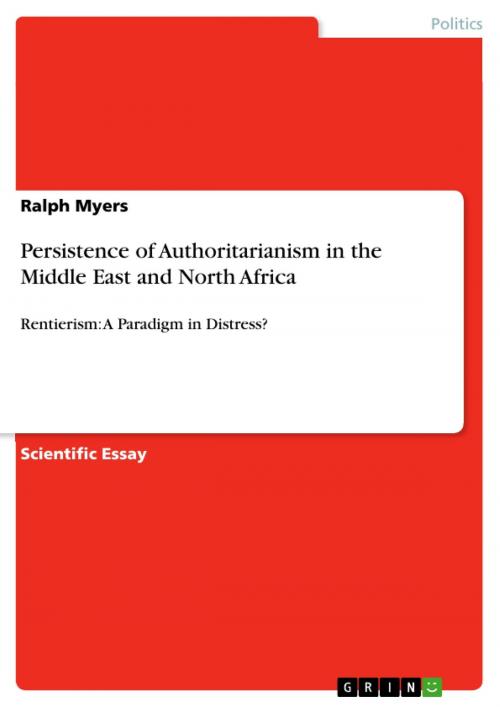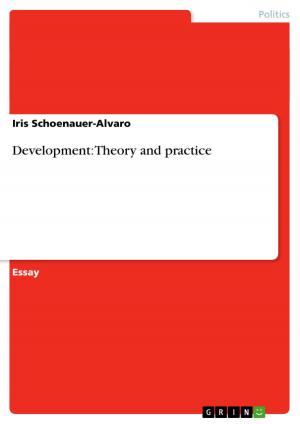Persistence of Authoritarianism in the Middle East and North Africa
Rentierism: A Paradigm in Distress?
Nonfiction, Social & Cultural Studies, Political Science, International, International Relations| Author: | Ralph Myers | ISBN: | 9783640773725 |
| Publisher: | GRIN Publishing | Publication: | December 9, 2010 |
| Imprint: | GRIN Publishing | Language: | English |
| Author: | Ralph Myers |
| ISBN: | 9783640773725 |
| Publisher: | GRIN Publishing |
| Publication: | December 9, 2010 |
| Imprint: | GRIN Publishing |
| Language: | English |
Scientific Essay from the year 2009 in the subject Politics - International Politics - Region: Near East, Near Orient, grade: 75%, Dublin City University, course: International Relations, language: English, abstract: The region of the Middle East and North Africa (MENA) appears to be an exception when it comes to the persistence of authoritarianism. Whereas most other regions in the world have embarked upon a path of democratisation, trends in the MENA appear to be adverse. Not only is the MENA's record appalling in terms of electoral democracies, but the region, on average, has not experienced an improvement in civil liberties and political rights for the last thirty years. This paper will look at two aspects concerning the persistence of authoritarianism in the region. The principal aim will be to analyse what the principle cause for the persistence of authoritarianism in the MENA is. A secondary objective will be to establish whether the term MENA exceptionalism is applicable, or whether the persistence of authoritarianism in the region can be explained through general theories on the subject. The paper analyses the reasons why scholars deem the MENA to be exceptional, and which variables they believe contribute to the persistence of authoritarianism in the region. Those arguments are then refuted, arguing instead that rentierism is the principal independent variable with regards to the robustness of authoritarian regimes in the MENA. The focus then shifts to the concept of rentierism in general and more specifically its relation to oil rich countries. Finally the paper looks at how oil poor countries also benefit from rents and how it is possible that levels of authoritarianism in oil rich countries are not hugely affected by oil price fluctuations.
Scientific Essay from the year 2009 in the subject Politics - International Politics - Region: Near East, Near Orient, grade: 75%, Dublin City University, course: International Relations, language: English, abstract: The region of the Middle East and North Africa (MENA) appears to be an exception when it comes to the persistence of authoritarianism. Whereas most other regions in the world have embarked upon a path of democratisation, trends in the MENA appear to be adverse. Not only is the MENA's record appalling in terms of electoral democracies, but the region, on average, has not experienced an improvement in civil liberties and political rights for the last thirty years. This paper will look at two aspects concerning the persistence of authoritarianism in the region. The principal aim will be to analyse what the principle cause for the persistence of authoritarianism in the MENA is. A secondary objective will be to establish whether the term MENA exceptionalism is applicable, or whether the persistence of authoritarianism in the region can be explained through general theories on the subject. The paper analyses the reasons why scholars deem the MENA to be exceptional, and which variables they believe contribute to the persistence of authoritarianism in the region. Those arguments are then refuted, arguing instead that rentierism is the principal independent variable with regards to the robustness of authoritarian regimes in the MENA. The focus then shifts to the concept of rentierism in general and more specifically its relation to oil rich countries. Finally the paper looks at how oil poor countries also benefit from rents and how it is possible that levels of authoritarianism in oil rich countries are not hugely affected by oil price fluctuations.















